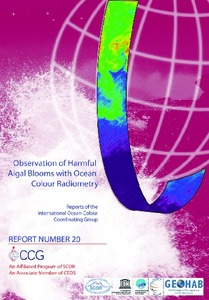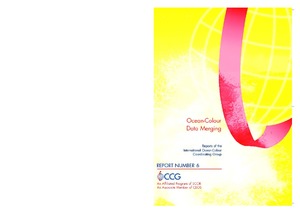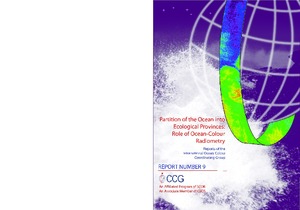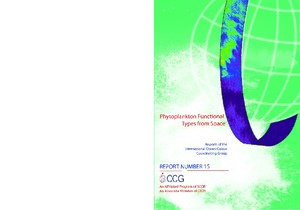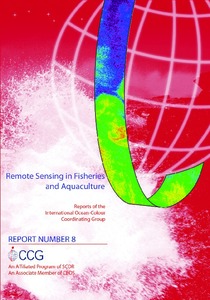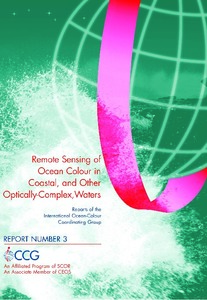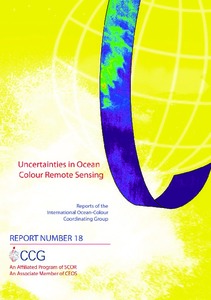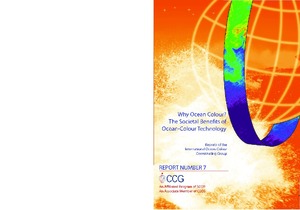Browsing IOCCG Community Practices by Subject "Data Management Practices::Data analysis"
Now showing items 1-13 of 13
-
Atmospheric Correction for Remotely-Sensed Ocean-Colour.
(International Ocean Colour Coordinating Group (IOCCG), Dartmouth, NS, Canada, 2010)Atmospheric correction is a key procedure in remote sensing of ocean colour. This report provides an overview of the various atmospheric correction algorithms used for global ocean-colour data processing, and quantifies ... -
Earth Observations in Support of Global Water Quality.
(International Ocean Colour Coordinating Group (IOCCG), Dartmouth, NS, Canada, 2018)Declining coastal, estuarine and inland water quality has become a global issue of significant concern as anthropogenic activities expand and climate change threatens to cause major alterations to the hydrological cycle. ... -
Guide to the Creation and Use of Ocean-Colour, Level-3, Binned Data Products.
(International Ocean Colour Coordinating Group (IOCCG), Dartmouth, NS, Canada, 2004)One of the goals of launching a number of ocean-colour sensors aboard various satellites is to build a long-term, multi-sensor, multi-year, ocean-colour archive. The derived chlorophyll concentrations (in time and space) ... -
Observation of Harmful Algal Blooms with Ocean Colour Radiometry.
(International Ocean Colour Coordinating Group (IOCCG), Dartmouth, NS, Canada, 2021)Harmful algal blooms (HABs) and eutrophication events have had a significant global impact over the past few years. The frequency of these events, and the geographic extent of toxic/harmful algal blooms have been increasing ... -
Ocean-Colour Data Merging.
(International Ocean Colour Coordinating Group (IOCCG), Dartmouth, NS, Canada, 2007)There are several ocean colour radiometry missions currently in orbit. Significant improvements in spatial coverage and temporal resolution can be achieved by combining data from the various missions. This report details ... -
Partition of the Ocean into Ecological Provinces: Role of Ocean-Colour Radiometry.
(International Ocean Colour Coordinating Group (IOCCG), Dartmouth, NS, Canada, 2009)Ocean colour remote sensing can be used to the partition the ocean ecosystem into biogeochemical provinces to reveal its underlying functional structure. This report outlines the state of the art in ocean classification ... -
Phytoplankton Functional Types from Space.
(International Ocean Colour Coordinating Group (IOCCG), Dartmouth, NS, Canada, 2014)The concept of phytoplankton functional types has emerged as a useful approach to classifying phytoplankton and can be used to obtain a better understanding of ecological and biogeochemical processes. Recent developments ... -
Remote Sensing in Fisheries and Aquaculture.
(International Ocean Colour Coordinating Group (IOCCG), Dartmouth, NS, Canada, 2009)Satellite remote sensing of ocean colour provides operational information at the required resolution in time and space to be useful for the sustainable management of ocean ecosystems as well as providing information on the ... -
Remote Sensing of Inherent Optical Properties: Fundamentals, Tests of Algorithms, and Applications.
(International Ocean Colour Coordinating Group (IOCCG), Dartmouth, NS, Canada, 2006)Variations in inherent optical properties (IOPs), i.e., the scattering and absorption characteristics of water and its constituents (the dissolved and suspended material) are clear indications of changes in water mass or ... -
Remote sensing of ocean colour in coastal, and other optically-complex, waters.
(International Ocean Colour Coordinating Group (IOCCG), Dartmouth, NS, Canada, 2000)As we understand more about the optical properties of aquatic substances and their influences on ocean colour, it became possible to envisage the use of ocean-colour data to retrieve information on substances other than ... -
Synergy between Ocean Colour and Biogeochemical/ Ecosystem Models.
(International Ocean Colour Coordinating Group (IOCCG), Dartmouth, NS, Canada, 2020)The goal of this report is to improve the communication between numerical modellers and the ocean colour community. It provides non-expert accessible information about both ocean colour and biogeochemical and ecosystem ... -
Uncertainties in Ocean Colour Remote Sensing
(International Ocean Colour Coordinating Group (IOCCG), Dartmouth, NS, Canada, 2019)This report on "Uncertainties in Ocean Colour Remote Sensing" summarizes the state of the knowledge on uncertainties related to ocean colour (OC) products and identifies ideas and recommendations to achieve significant ... -
Why Ocean Colour? The Societal Benefits of Ocean-Colour Technology.
(International Ocean Colour Coordinating Group (IOCCG), Dartmouth, NS, Canada, 2008)The concentration of chlorophyll in the ocean (or in fresh water) is an index of phytoplankton biomass, and is an important property that can be monitored through ocean colour radiometry (OCR) by Earth-orbiting spacecraft. ...
 Repository of community practices in Ocean Research, Applications and Data/Information Management
Repository of community practices in Ocean Research, Applications and Data/Information Management



